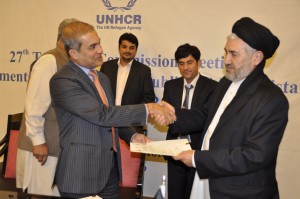Press Release
ISLAMABAD (19 July, 2016): The Representatives of the Islamic Republics of Pakistan, Afghanistan and the UN Refugee Agency (UNHCR) on Tuesday underlined their commitment to empower Afghan refugees in Pakistan and to pro-actively work towards their voluntary repatriation and sustainable reintegration in Afghanistan. They called on the international community to support these efforts aimed at achieving the common cause of bringing Afghanistan’s protracted refugee chapter to a close and putting an end to future displacement within and beyond the country.
All parties reaffirmed their commitment to the Solutions Strategy for Afghan Refugees (SSAR) which remains the regional framework for identifying and implementing lasting solutions for the 1.5 million registered Afghan refugees in Pakistan, with voluntary repatriation in safety and dignity as the preferred solution.

UNHCR’s Representative in Pakistan, Indrika Ratwatte and Afghanistan’s Minister of Refugees and Repatriation (MoRR) Sayed Hossein Alimi Balkhi exchanging signed Tripartite Agreement document at Burbhan on Tuesday. (c) UNHCR/A.Shahzad
The UN Refugee Agency hosted the 27th Tripartite Commission Meeting in Bhurban, Murree, on Tuesday that was attended by the Federal Minister for States and Frontier Regions (SAFRON), Lt General (Rtd) Abdul Qadir Baloch, Afghanistan’s Minister of Refugees and Repatriation (MoRR) Sayed Hossein Alimi Balkhi, UNHCR’s Representative in Pakistan, Indrika Ratwatte and UNHCR’s Representative in Afghanistan, Ms. Maya Ameratunga and other Government and UN officials.
The parties at the occasion also signed the extension of the existing Tripartite Agreement till 31st December 2016 between the Governments of the Islamic Republics of Pakistan and Afghanistan and UNHCR that governs voluntary repatriation in safety and dignity. Under the arrangement, more than 3.9 million Afghan refugees have gone back to Afghanistan since 2001.
The representatives reiterated their commitment for joint advocacy and resource mobilization to support the implementation of the SSAR and the Government of Afghanistan’s and Pakistan’s plans on voluntary return and sustainable reintegration of Afghan refugees, as well as pro-active joint initiatives around the upcoming United Nations General Assembly Summit for Refugees and Migrants and the Brussels Conference on Afghanistan.
Both Governments expressed their appreciation to UNHCR for the recent doubling of the repatriation and reintegration grant up to USD 400 per individual, provided to returnees upon arrival in Afghanistan, as announced by the UN High Commissioner for Refugees during his recent visit to the region.
UNHCR’s Representative in Pakistan Mr. Indrika Ratwatte while lauding the decision of the Government of Pakistan to extend the validity of the Proof of Registration cards until 31 December 2016, said that UNHCR recognizes Pakistan’s generosity for hosting millions of Afghan refugees on its soil. This hospitality contributes an immense contribution to the global public good.
He said that the enhanced repatriation grant announced by the High Commissioner will help facilitate the immediate reintegration of returnees in Afghanistan, however, he stressed the need for robust support of the development actors in ensuring the sustainability of voluntary returns in Afghanistan and in providing tangible support to host communities in Pakistan, pending return. “Empowering refugee youth through education, skills training and livelihoods support, is imperative for sustainable reintegration and for prosperity and stability in Afghanistan and the region,” Ratwatte said.

UNHCR’s Representative in Pakistan, Indrika Ratwatte and Federal Minister for States and Frontier Regions (SAFRON), Lt General (Rtd) Abdul Qadir Baloch, exchanging signed Tripartite Agreement document at Burbhan on Tuesday. (c) UNHCR/A.Shahzad
Speaking at the occasion, Federal Minister for SAFRON Abdul Qadir Baloch reaffirmed the Government of Pakistan’s commitment to continue working closely with the Government of Afghanistan and UNHCR to ensure sustainable voluntary returns in safety and dignity, as evidenced by the recent constitution of an Inter-Ministerial Committee, headed by Secretary SAFRON, and tasked with devising a voluntary repatriation plan.
While acknowledging and commending the Comprehensive Voluntary Repatriation and Reintegration Strategy of the Government of Afghanistan, the Minister urged and encouraged the Government of Afghanistan to work on immediate, concrete and tangible plans for receiving and reintegrating Afghan returnees in view of the implementation of the enhanced voluntary repatriation and reintegration grant and the Government of Pakistan’s voluntary repatriation plan. He urged the international community to support the Government of Afghanistan in the implementation of this strategy with tangible results.
Afghanistan’s Minister of Refugees and Repatriation (MoRR) Sayed Hossein Alimi Balkhi stressed the importance of reinvigorated efforts to create an environment conducive for voluntary repatriation and sustainable reintegration in Afghanistan, including improved access to basic services and livelihood opportunities, and land tenure reform. He noted that a detailed action plan will be finalized by early September.
“We pay gratitude to the Government and people of Pakistan for hosting millions of Afghan refugees and economic migrants for more than three decades amidst economic challenges and significant strain on the infrastructure and resources,” he said.
UNHCR Representative in Afghanistan Ms. Maya Ameratunga said collective efforts backed by strong support of the international community for reintegration programmes will be critical to meet the needs of returnees in Afghanistan and thereby ensure sustainability of returns and prevent further displacement.
“At a time when the global spotlight is on Afghan population movements to Europe, it is vital to recognize that the largest population of Afghan refugees, returnees and displaced persons in need, are right here in our midst. Now more than ever, Afghanistan and the sub-region need the support of the international community,” said Ms. Ameratunga.
Share on Facebook Share on Twitter